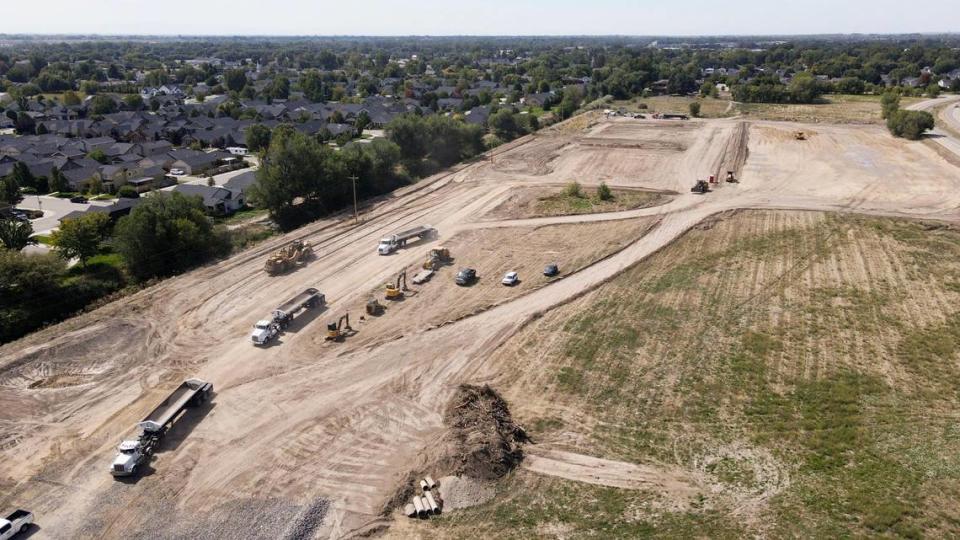Neighborhood group scores a victory over city of Boise with Idaho Supreme Court ruling
The Idaho Supreme Court ruled against Boise in a key part of a lawsuit challenging the city’s approval of a controversial development in the northwest corner of town.
But the ruling won’t stop work already underway to build the Prominence subdivision of 130 houses and 96 apartments along Hill Road.
The North West Neighborhood Association fought the Prominence proposal for years, with members saying it would destroy the area’s semirural character. But the City Council eventually approved it. An Ada County judge rejected the association’s argument in a judicial review, so the association appealed the Idaho Supreme Court.
The association said the subdivision, led by Boise developer John A. Laude Sr.’s Trilogy Development, would harm wildlife and lacked an adequate provision for firefighting. The association also argued that the City Council had violated its rights by not allowing due process during public hearings, according to prior Idaho Statesman reporting.
The Supreme Court found fault with part of the council’s decision-making and reversed the Ada County judge’s decision in part. The court returned the case to the lower court with instructions to invalidate the actions of the City Council and go through some steps of the development process again, according to the court’s summary statement.
But the Supreme Court rejected the association’s claims that it was not allowed due process during hearings.
Richard Llewellyn, president of the North West Neighborhood Association, said the court’s Sept. 7 ruling was an opportunity for greater transparency in development in Boise and beyond.
“These are the most important decisions in a lot of people’s lives,” Llewellyn said in a phone interview with the Idaho Statesman. “It’s important that we do it right.”
The court’s ruling won’t stop the development, but Llewellyn said it will allow neighbors a chance to weigh in. The development process will start again at a new checkpoint at which residents can challenge things if they need to, he said.

Rewinding the clock
The battle began in 2018 when a group of developers including Trilogy and Meridian-based Corey Barton Homes submitted an application to build Prominence on about 38 acres of land in an area often referred to as “Old Hill Road.”
The development originally called for 286 homes made up of 156 single-family houses and 130 apartments at 8633 N. Bogart Lane.
The Boise Planning and Zoning Commission denied two parts of the application after hearing from residents and receiving a petition with roughly 2,500 signatures in opposition, according to the Supreme Court’s ruling.
The commission denied the application partly because “there was a lack of essential fire services needed to support the project,” according to the ruling. The commission recommended that Boise City Council deny the rest of the application.
The Ada County Highway District Commission also expressed concerns about the development’s traffic impact on Hill Road Parkway and Bogart Lane.
After its initial meeting, the City Council asked the developers to meet with the North West Neighborhood Association to address concerns and present modified plans. The modifications lowered the number of living units from 286 to 226, made changes to open spaces and pathways, replaced town houses with single-family homes and redesigned the apartment complex.
The City Council unanimously approved the revised project and reversed the Planning and Zoning Commission’s denial despite making few efforts to address fire and traffic concerns.
Supreme Court ruling
The Idaho Supreme Court found that the city failed to explain its reasoning for overturning the Planning and Zoning Commission’s decision and approving the application despite traffic safety concerns and the lack of fire services in the area.
“The council’s one and one-half page ‘reason for decision’ is largely conclusory and does not identify decision criteria or address the fire safety or traffic issues raised by NWNA in any meaningful fashion,” the Supreme Court wrote. “To put it simply, we cannot evaluate the process by which the council reached its decision or the soundness of its legal reasoning.”
But the court found that the errors were not a good enough reason to stop the development.
“Because the Supreme Court did not find fault with the public hearing process or anything else leading up to the 2019 decision, the grading and construction currently happening at the site can continue,” Maria Weeg, spokesperson for Mayor Lauren McLean, wrote in an email to the Statesman.
The City Council will need to write a reasoned statement for its decisions despite the fact that only one of the 2019 council members is still serving the city: McLean. The council may also hold more public hearings.
Weeg said the city’s Planning and Development Services and legal departments are working on revised findings while they wait for the official order from the court. They City Council will review them at the next available meeting after they receive the order, she said.
Can Boise neighbors stop a development? Residents prepare appeal to Idaho Supreme Court
Neighbors furiously fought this Boise housing development. Here’s what a judge just ruled
What it took for Boise City Council to approve a subdivision neighbors fought for months
Neighbors loathe this subdivision. ACHD had ‘significant concerns.’ Here’s what the city said

